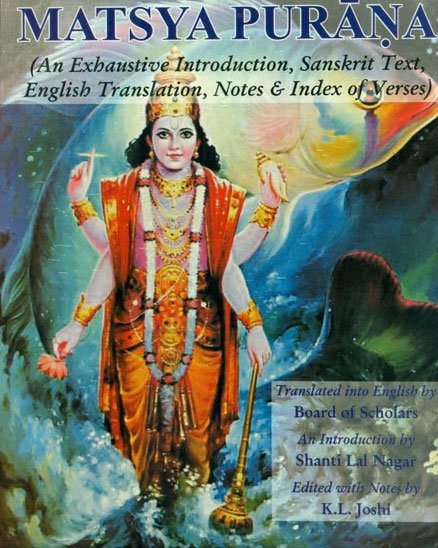The Matsya Purana (critical study)
by Kushal Kalita | 2018 | 74,766 words | ISBN-13: 9788171103058
This page relates ‘Vaishnavism: The Vishnu-cult’ of the English study on the Matsya-purana: a Sanskrit text preserving ancient Indian traditions and legends written in over 14,000 metrical verses. In this study, the background and content of the Matsyapurana is outlined against the cultural history of ancient India in terms of religion, politics, geography and architectural aspects. It shows how the encyclopedic character causes the text to deal with almost all the aspects of human civilization.
Part 1 - Vaiṣṇavism: The Viṣṇu-cult
Vaiṣṇavism is one of the most important cults of Hindu religion. Vaiṣṇavism upholds that Lord Viṣṇu is the ultimate reality. In this cult Viṣṇu is worshipped as the Supreme Being. The devotee of Lord Viṣṇu believes that worship of Viṣṇu leads to the realization of the highest spiritual goal, i.e., paramapuruṣārtha. It should be noted that the core belief of the followers of Vaiṣṇavism is either in Viṣṇu or in his different forms like Rāma, Kṛṣṇa, Vāsudeva etc. and devotion to Him.
The name Viṣṇu means one who pervades the universe (vyāpana).[1] According to the Matsyapurāṇa, the word viṣṇu is derived from vi with √stambh, which means to check, to support. Thus the etymological meaning of Viṣṇu is determined as one who is the support of the whole universe.[2] Again the term viṣṇu is also derived from √viṣ which means to pervade or from √viś which means to enter. The Matsyapurāṇa also derives it from √viś (to enter) and maintains that Viṣṇu pervades the whole world by entering everything.[3] In the Viṣṇupurāṇa also the word viṣṇu is derived from the root viś.[4] Thus, it is clear that Viṣṇu is one who regulates this world by pervading it. In another place of the Matsyapurāṇa, it is said that the Lord is called Viṣṇu because of his power and all-pervasiveness.[5]
In the Vedas the reference of Viṣṇu is less in comparison to other deities like Agni and Indra. Viṣṇu in the Ṛgveda lacks that quality by which he could be recognized as a major god. In Ṛgveda, Viṣṇu occupies a subordinate position as there are hardly five (5) hymns attributed to Viṣṇu and the name of Viṣṇu arises not more than one hundred (100) times in all.[6] The greatness of Viṣṇu lies in only being the friend of Indra.[7] Viṣṇu is found more associated with sacrifice than with devotion and grace in the later Vedic texts. He is not regarded as the greatest God in the Vedic period.
The importance of Viṣṇu started rising along with Rudra during the period of Saṃhitās and Brāhmaṇas.[8] The Aitareyabrāhmaṇa places him at the top of Hindu pantheon.[9] The Śatapathabrāhmaṇa mentions that Viṣṇu by his strides acquired for the gods, the all pervading power which they possess.[10] In the epics and Purāṇas, Viṣṇu is identified with Vāsudeva, Kṛṣṇa and Nārāyaṇa. In these works, the name Vāsudeva, Kṛṣṇa and Nārāyaṇa are referred to more frequently and prominently than the name Viṣṇu.
Almost all the Purāṇas have exhaustively dealt with Vaiṣṇavism. In the sāttvika Purāṇas, viz., Viṣṇupurāṇa, Bhāgavatapurāṇa, Nāradīyapurāṇa, Garuḍapurāṇa, Padmapurāṇa and Varāhapurāṇa which are pronouncedly Vaiṣṇavite in nature, Viṣṇu is regarded as the ultimate reality and the cause of all. However, many of the other Purāṇas, which are not Vaiṣṇava Purāṇas, give Lord Viṣṇu the highest position among the gods. Thus, the Purāṇas like Vāyu, Agni, Mārkaṇḍeya etc. have given the most important position to Viṣṇu. The Matsyapurāṇa, though a tāmasika Purāṇa, declares Viṣṇu as the Supreme Reality.
Footnotes and references:
[2]:
[3]:
vyāptaṃ tvayaiva viśatā trailokyaṃ sacarācaram//
tasmad' viṣṇuriti proktaḥ svayameva svayambhuvā/
–Ibid., 248. 41
[4]:
Viṣṇupurāṇa, 3.1.45
[5]:
Cf., prabhavādapi tadvyāptyā viṣṇutvamagamat punaḥ/ Matsyapurāṇa, 2.30
[6]:
Cf., Arthur Berriedale Keith, The Religion and Philosophy of the Veda and Upanishads, Part I, p.108
[8]:
Cf., Arthur Berriedale Keith, The Religion and Philosophy of the Veda and Upanishads, Part I, p.108
[9]:
Aitareyabrāhmaṇa, I.1
[10]:
Cf., Śatapathabrāhmaṇa, I.9.39
